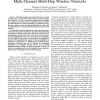28 search results - page 5 / 6 » Power Allocation Games in Wireless Networks of Multi-antenna... |
ICC
2009
IEEE
13 years 2 months ago
2009
IEEE
Typically, topology control is perceived as a per-node transmit power control process that achieves certain networklevel objectives. We take an alternative approach of controlling ...
VTC
2007
IEEE
13 years 11 months ago
2007
IEEE
— Cooperative diversity obtains the spatial diversity gains created by sharing antennas of terminals in wireless networks. In this paper, adaptive amplify-and-forward (AF) cooper...
CDC
2009
IEEE
13 years 9 months ago
2009
IEEE
— This paper investigates design of noncooperative games from a control theoretic perspective. Pricing mechanisms are used as a design tool to ensure that the Nash equilibrium of...
SIGMETRICS
2008
ACM
13 years 4 months ago
2008
ACM
We consider a wireless collision channel, shared by a finite number of mobile users who transmit to a common base station using a random access protocol. Mobiles are selfoptimizin...
IJDSN
2006
13 years 4 months ago
2006
Abstract-- We present a novel formulation of the problem of energy misbehavior and develop an analytical framework for quantifying its impact on other nodes. Specifically, we formu...

